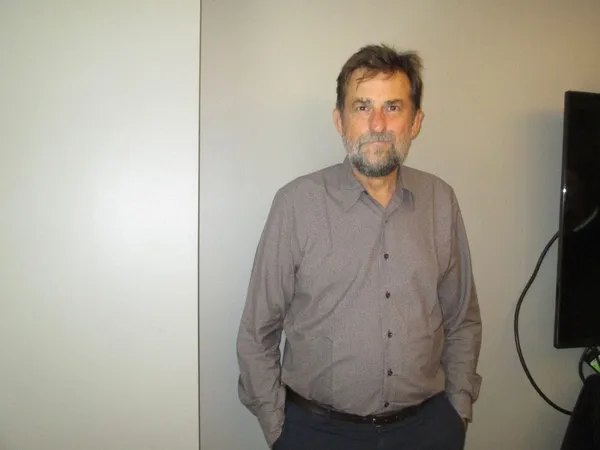 |
| Nanni Moretti on John Turturro: "… there is always a component of craziness that I appreciate." Photo: Anne-Katrin Titze |
Nanni Moretti's stingingly beautiful examination of the hazards of movie making during a point in time of private pain, Mia Madre (My Mother) stars Margherita Buy, Giulia Lazzarini, John Turturro, Beatrice Mancini, Enrico Ianniello and Moretti himself.
Things turn from complicated to ridiculous with the arrival of American actor Barry Huggins (Turturro) to be cast in Margherita's (Buy) new workers strike film. Creepy as hell and needy, he mimics phone calls from Stanley Kubrick and jokes about having a Kevin Spacey dream. "I'll kill you," is one of the first sentences we hear him mutter, three-quarters asleep on the backseat of her car after she picks him up at the airport herself. Putting up with Huggins' diva behavior is an extra burden, because she is worried about Ada (Lazzarini), her mother, who is in the hospital.
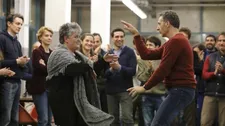 |
| Barry Huggins (John Turturro): "The scene as such was already in the script." |
Moretti, as Margherita's mindful brother Giovanni, evokes admiration. Homemade pasta and other delicacies are brought by him to the hospital bed, which makes Margherita hide her store-bought goodies. This is a lovely and very rare competition to see in a movie - two siblings who actually both care.
Turturro epitomises the concept of the unbearable actor and grandiosely over-estimates his own skills in learning lines in Italian. This entertainment monster is let loose on Margherita's frail psyche.
Anne-Katrin Titze: Let's talk about Barry Huggins. The name first of all. You don't want to hug him at all!
Nanni Moretti: I actually chose John Turturro for two reasons. First of all, he is an actor that I like and respect a lot and then in his interpretations, there is always a component of craziness that I appreciate. And the other reason was, that he already had a connection with Italian culture. He had family that was originally from Italy. He worked with Italian filmmakers already and he's made a very beautiful documentary on Neapolitan music, called Passion.
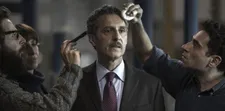 |
| Turturro on Barry Huggins' dance moves: "Don't worry, Nanni, don't worry. I will take care of it." |
He [Turturro] immediately understood the script and he grasped the spirit of the character. He understood that he was at liberty to add something of his own and improvise and I allowed him to do that.
AKT: Did he come up with the dance?
NM: The scene as such was already in the script. I asked him, "would you like to have a choreographer?" And Johnny told me: "Don't worry, Nanni, don't worry. I will take care of it. I will do it on my own, don't worry." So all those gestures, he improvised that.
AKT: Did he also get to pick the woman from the crew to dance with?
NM: No. I even did some dancing auditions for that character.
AKT: His moves are hilarious, channeling Michael Douglas in Basic Instinct. You have a wonderful juxtaposition in the film about language. The precision and logic of Latin and on the other hand, actors learning lines. You hand the difference to us and let us decide what to make of it, it never feels didactic.
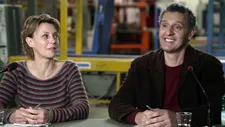 |
| Margherita gives Barry the look: "Margherita was always on a different plane compared to where she actually is at any given moment." |
NM: I try not to give too many explanations to my viewers. I hope I have an adult audience in front of me. There's many things that I don't explain or highlight. For example, Giovanni's private life, his job. I leave those to the viewer's imagination. Also in terms of the relationship between Margherita and the ex-husband.
I don't spend time explaining with dialogues why they broke up or what their relationship was like when they were together. He comes back from a ski holiday with the daughter and he's an ex-husband - that's it.
AKT: A scene I liked very much is when the electric company guy comes by and Margherita can't find the electric bill. That's when she starts crying. It takes that stupid little thing that gets all the emotions going.
NM: Clearly in scenes such as that one, the actress needs to be up to the challenge. And clearly, Margherita Buy, is that. If she overplays it, this scene is ruined. If she underplays it, then the scene never takes off.
AKT: Margherita Buy is fantastic. There is another character I wanted to talk about and that is Barry's translator. Is he even a translator? Who is he?
_225.webp) |
| Margherita (Margherita Buy): "Within her everything coexists at the same time and with the same urgency." |
NM: I wanted for him to be a machine with no feelings.
AKT: The levels of reality are not all the same. This isn't - the world is all a stage. There is an emotional reality that is more important than another one. This is what lingers from the film. Sometimes we are so preoccupied with little things at work and functioning that the most important things are forgotten.
NM: Yes, it was as if Margherita was always on a different plane compared to where she actually is at any given moment. And the present time in the movie actually follows Margherita's emotional state. Within her everything coexists at the same time and with the same urgency. The issues with her job, the preoccupation about her daughter, the pain for the mother, and at the same time, there's her fears, her memories, her dreams, her imagination.
AKT: And with Barry, there is this moment when he shouts "Take me back to reality!" It sounds so fake at that moment, and yet you know it is true. It is what he wants. He is stuck in that actor-li-ness.
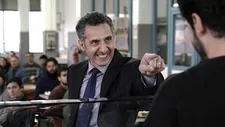 |
| "He understood that he was at liberty to add something of his own and improvise and I allowed him to do that." |
NM: Yes, I agree. That was my intention.
AKT: Margherita says at one point that she can't get any "real faces." They all have false eyebrows or lips. That search for the "real" is that something you know, too?
NM: Both as a person and as a filmmaker, I don't so much believe in spontaneity but in authenticity. These two concepts are very different from each other. This also applies to acting, which must be authentic but not plainly spontaneous. About this I would like to add something else. I don't like those interpretations in which actors are so in character that they themselves disappear.
AKT: No, You want "the actor next to the character".
Moretti laughs because I am quoting back a line from his film.
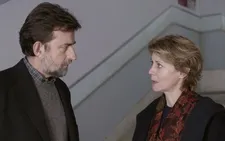 |
| Giovanni (Nanni Moretti) with Margherita: "I don't so much believe in spontaneity but in authenticity." |
NM: Yes! Those performances that I personally don't particularly like, tend to be very successful with the audience or with critics. If you're curious, though, I don't actually say those things to the actors. I think them but I don't spell them out.
AKT: You just do it with your eyes?
NM: I would say the acting component is one of the components of a film that I work the most on.
Read Nanni Moretti on Wim Wenders' angels from Wings Of Desire, the significance of We Have A Pope (Habemus Papam), learning Latin and what remains with us when someone we care about passes on.
























